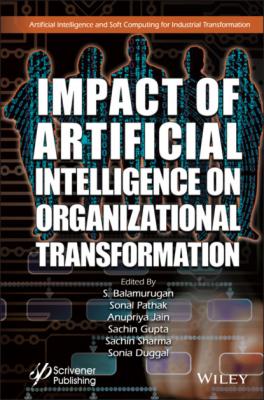Impact of Artificial Intelligence on Organizational Transformation. Группа авторов
Читать онлайн.| Название | Impact of Artificial Intelligence on Organizational Transformation |
|---|---|
| Автор произведения | Группа авторов |
| Жанр | Программы |
| Серия | |
| Издательство | Программы |
| Год выпуска | 0 |
| isbn | 9781119710271 |
1.6 Implication for Managers
AI is influencing various functions of management. The AI can help managers especially in human resource management and marketing management. Earlier, the HR managers had to spend a lot of time in screening various candidates manually. Similarly, biasness prevailed in recruitment, performance appraisal process, etc. Now, the managers can use AI to overcome issues of biasness. With the advent of AI in HR, the recruitment and hiring process has become faster as AI can auto screen thousands of resumes in a minute which are free from biasness. Besides, the managers can also use AI for engaging its workforce and employee retention. The orientation and onboarding processes have become easy.
In marketing management, earlier, the managers had to rely on the market research, data mining to interpret the market trends, customer’s needs, taste, and preferences. The AI has made possible the above interpretations in the real-time scenario. As it can precisely estimate the probability of a customer making a purchase and also can predict the customer value [36]. The benefits of using AI and ML in marketing is improved efficiency and optimal utilization of marketing efforts and resources, time-saving, creation of better customer profiles, and transforming customer satisfaction into customer delight [28].
Figure 1.3 Martec’s Law.
AI offers quality and quick decision-making to the managers. The managers should look to AI as a tool for empowering and supporting them rather than replacing them. Thus, the managers should adopt AI in various aspects of management like HR, marketing, finance, etc. Since AI automates various process-oriented task administration tasks, therefore managers should adopt AI so that they may shift their focus from administrative tasks to cross-functional reasoning tasks. Such a human-machine association will generate various new jobs and will pave way for innovation.
But technology is changing at a fast pace. Since the concept of AI implementation is a capital-intensive activity and continuous up-gradation is required. According to Martec’s Law, “technology changes exponentially, organizations change logarithmically” [6], as depicted in Figure 1.3. This becomes a challenge for organizations from developing countries. Thus, managers in developing countries should try to keep pace with technological advances.
1.7 Conclusion
Thus, it can be concluded that AI disruption is rapidly revolutionizing the various functions of HR, marketing, finance, etc. AI in the field of HR has facilitated quality hiring and ensured transparency in compensation management and performance management. AI is also helping in removing biasness in recruitment and performance appraisal and is assisting the organizations in employee retention. AI has widely reduced the cost of the organizations with respect to hiring, training, and engaging the employees.
Today, businesses are generating huge data, especially from the e-commerce segment. The companies can gain a competitive advantage with this data. AI and ML have paved the way to analyze, scrutinize, and draw precise inferences and recommendations. The AI is enhancing the marketing strategies for the businesses. AI disruption is helping in quick and effective decisions. ML is optimizing the advertising and customer segmentation. AI and ML are also helping companies with better product design to the delight of the customers. Therefore, the organizations should embrace AI for empowering and supporting their employees so that the focus of the employees shifts from administrative tasks to cross-functional reasoning tasks.
References
1. Ahuja, A., Heave a sigh of relief HR, Amber’s here to help. [Online] Livemint. Retrieved from https://www.livemint.com/Leisure/G5Dnhxq3i9jt78gDoCgn7K/Heave-a-sigh-of-relief-HR-Ambers-here-to-help.html, 2018.
2. Amla, M. and Malhotra, P.M., Digital Transformation in HR. Int. J. Interdiscip. Multidiscip. Stud. (IJIMS), 4, 3, 536–544, 2017, Retrieved from http://www.ijims.com.
3. McCarthy, J., Programs with Common Sense at the Wayback Machine (archived October 4, 2013), in: Proceedings of the Teddington Conference on the Mechanization of Thought Processes, Her Majesty’s Stationery Office, London, pp. 756–91, 1959.
4. Arbaiy, N. and Suradi, Z., Staff performance appraisal using fuzzy evaluation, in: IFIP International Conference on Artificial Intelligence Applications and Innovations, 2007, September, Springer, Boston, MA, pp. 195–203.
5. de Jesus, A., AI for Pricing–Comparing 5 Current Applications. Emerj. Retrieved from https://emerj.com/ai-sector-overviews/ai-for-pricing-comparing-5-current-applications/2019.
6. Brinker, S., Martec’s Law: the greatest management challenge of the 21st century. [Online] Chiefmartec.com. Retrieved from https://chiefmartec.com/2016/11/martecs-law-great-management-challenge-21stcentury/., 2016.
7. Bughin, J., Seong, J., Manyika, J., Chui, M., Joshi, R., Notes from the AI frontier: Modeling the global economic impact of AI, McKinsey Global Institute, 2018, Retrieved from https://www.mckinsey.com/featured-insights/artificial-intelligence/notes-from-the-ai-frontiermodeling-the-impact-of-ai-on-the-world-economy.
8. Carbonell, J.G., Learning by analogy: Formulating and generalizing plans from past experience, in: Machine learning, pp. 137–161, Springer, Berlin, Heidelberg, 1983.
9. Davenport, T.H., Loucks, J., Schatsky, D., Bullish on the business value of cognitive: Leaders in cognitive and AI weigh in on what’s working and what’s next. Deloitte state of cognitive survey. Retrieved from https://www2.deloitte.com/content/dam/Deloitte/us/Documents/deloitte-analytics/us-da-2017-deloitte-state-of-cognitive-survey.pdf, 2017.
10. Eubanks, B., Artificial intelligence for HR: use AI to support and develop a successful workforce, Kogan Page Limited, United Kingdom, 2018.
11. Forrest, E. and Hoanca, B., Artificial intelligence: Marketing’s game changer, in: Trends and innovations in marketing information systems, pp. 45–64, IGI Global, US, 2015.
12. Gray, K., AI can be a troublesome teammate, Harvard Business Review, Boston, 2017, July 20, Retrieved from https://hbr.org/2017/07/ai-can-be-a-troublesome-teammate, February 11, 2019.
13. Grillo, M., What types of predictive analytics are being used in talent management organizations?, Cornell University, ILR School, New York, 2015.
14. George, G. and Thomas, M.R., Integration of Artificial Intelligence in Human Resource. Int. J. Innov. Technol. Exploring Eng. (IJITEE), 9, 2, 5069–5073, 2019, Blue Eyes Intelligence Engineering & Sciences.
15.
